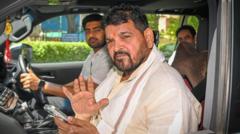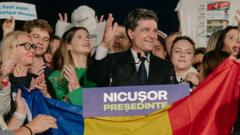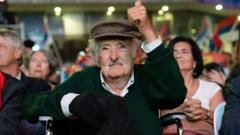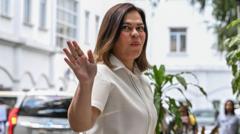Regional and parliamentary elections in Venezuela have resulted in a proclaimed landslide victory for the ruling United Socialist Party (PSUV) led by Nicolás Maduro, despite widespread opposition boycotting the polls and questioning the credibility of the electoral processes.
Venezuela's Ruling Party Declares Election Triumph Amid Opposition Boycott
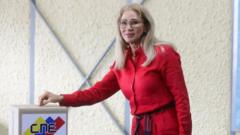
Venezuela's Ruling Party Declares Election Triumph Amid Opposition Boycott
Venezuelan ruling party proclaims decisive victory in elections as opposition parties choose to abstain.
In the past few hours, Venezuela's ruling party has announced an "overwhelming victory" following regional and parliamentary elections, where participation was largely diminished due to the boycott by principal opposition parties. The National Electoral Council (CNE), largely perceived as a government puppet, reported that candidates from the United Socialist Party of Venezuela (PSUV) won 23 out of 24 governorships, alongside an overwhelming majority of approximately 82.68% for the National Assembly vote.
Opposition leader María Corina Machado has been vocal against the legitimacy of the elections, claiming that the turnout was less than 15%, while the CNE asserted it was around 42.6%. Machado condemned the elections as a "farce" and highlighted the abstention as an indication of public dissent against the regime.
Independently gathered accounts from journalists noted mere trickles of voters at polling stations, suggesting a significant disinterest in participating in a process deemed fraudulent by the opposition. Machado, who has remained in the country despite ongoing repression against dissent, previously advocated for a boycott, underscoring the importance of adhering to the results of the 2023 presidential elections before considering new electoral cycles.
Despite the boycott, a handful of opposition figures, including Henrique Capriles, pursued candidacies, facing backlash from their party members. While Capriles defended voting as an act of resistance, others criticized the decision as a betrayal of the opposition's collective stance.
The results indicate that the PSUV's control of gubernatorial offices has increased further, including regaining the states of Zulia and Barinas, historically significant to Hugo Chávez's political legacy. Only one state, Cojedes, remains under opposition authority thanks to the victory of Alberto Galíndez.
The election period was marred by a series of arrests focused on detaining opposition members purportedly plotting to disrupt the vote. Figures such as Juan Pablo Guanipa were among those arrested, with accusations labeled by Machado as "state terrorism."
Adding further controversy, voters were required to select representatives for the Essequibo region, claimed by Venezuela but internationally administered by Guyana. In defiance of an International Court order, polling took place in an artificial district inside Venezuela, leading to the election of a representative with no actual jurisdiction over the territory in question, a move condemned by Guyana's President Irfaan Ali as opportunistic.
This election process in Venezuela continues to spotlight the longstanding tensions between the opposition and the Maduro government, calling into question the future of democracy in the nation.
Opposition leader María Corina Machado has been vocal against the legitimacy of the elections, claiming that the turnout was less than 15%, while the CNE asserted it was around 42.6%. Machado condemned the elections as a "farce" and highlighted the abstention as an indication of public dissent against the regime.
Independently gathered accounts from journalists noted mere trickles of voters at polling stations, suggesting a significant disinterest in participating in a process deemed fraudulent by the opposition. Machado, who has remained in the country despite ongoing repression against dissent, previously advocated for a boycott, underscoring the importance of adhering to the results of the 2023 presidential elections before considering new electoral cycles.
Despite the boycott, a handful of opposition figures, including Henrique Capriles, pursued candidacies, facing backlash from their party members. While Capriles defended voting as an act of resistance, others criticized the decision as a betrayal of the opposition's collective stance.
The results indicate that the PSUV's control of gubernatorial offices has increased further, including regaining the states of Zulia and Barinas, historically significant to Hugo Chávez's political legacy. Only one state, Cojedes, remains under opposition authority thanks to the victory of Alberto Galíndez.
The election period was marred by a series of arrests focused on detaining opposition members purportedly plotting to disrupt the vote. Figures such as Juan Pablo Guanipa were among those arrested, with accusations labeled by Machado as "state terrorism."
Adding further controversy, voters were required to select representatives for the Essequibo region, claimed by Venezuela but internationally administered by Guyana. In defiance of an International Court order, polling took place in an artificial district inside Venezuela, leading to the election of a representative with no actual jurisdiction over the territory in question, a move condemned by Guyana's President Irfaan Ali as opportunistic.
This election process in Venezuela continues to spotlight the longstanding tensions between the opposition and the Maduro government, calling into question the future of democracy in the nation.


